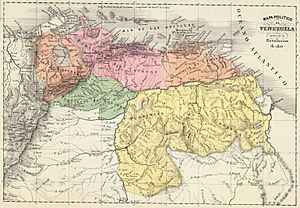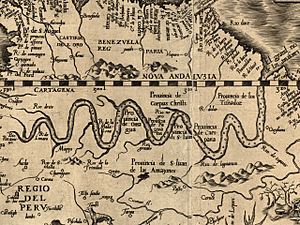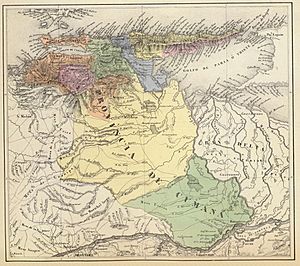New Andalusia Province facts for kids
The New Andalusia Province (also called the Province of Cumaná) was an important area in what is now Venezuela. It existed for a long time, from 1537 to 1864. This province was first part of the Spanish Empire. Later, it became part of Gran Colombia and then Venezuela.
This province covered a large area. It included parts of today's Venezuelan states like Sucre, Anzoátegui, and Monagas. Its main cities were Cumaná (the capital) and New Barcelona.
Contents
New Andalusia Under Spanish Rule
The main city of the province was Cumaná. It was officially started again in 1569 by an explorer named Diego Hernández de Serpa. When it was first created, the province was much bigger. It included parts of what is now eastern Venezuela, western Guyana, and even northern Brazil.
Over many years, the size of the province got smaller. Eventually, it mostly included just the areas around Cumaná and Barcelona. So, the names "New Andalusia Province" and "Cumaná Province" became interchangeable.
Changes to the Province's Borders
A Spanish leader named Joan Orpí created a new province called Nueva Cataluña (New Catalonia). It was also known as New Barcelona after its capital city, Barcelona. This new province was partly made from land that belonged to New Andalusia.
However, New Catalonia only lasted from 1637 to 1654. After that, it became part of New Andalusia again. The Guayana Province (started in 1585) formed the southern border. The Venezuela Province was on its western side.
For most of its history, the Royal Audience of Santo Domingo helped manage the province. This group made sure laws were followed and handled legal matters. Later, in the late 1700s, New Andalusia became part of the new Captaincy General of Venezuela. This was a larger area controlled by Spain.
New Andalusia in Gran Colombia
After Venezuela declared its independence in 1811, the New Andalusia Province joined the new country of Gran Colombia. It became one of the many Provinces of Gran Colombia. After 1824, it was part of the Orinoco Department within Gran Colombia.
The capital city of the province remained Cumaná.
Regions Within the Province
The province was divided into smaller areas called cantons. These cantons included:
- Cumaná
- Carupano
- Cumanacoa
- Maturín
- Cariaco
- Aragua Cumanés
- Río Caribes
After Venezuela became fully independent in 1830, New Andalusia continued as a Province of Venezuela. It stayed this way until 1864. In 1864, Venezuela changed its system and created new States of Venezuela.
Between 1810 and 1840, the province lost one of its cantons. This was the Canton Piacoa, which covered the Orinoco River delta. This area became part of the Guayana Province. Later, it became the state of Delta Amacuro.
See also
 In Spanish: Provincia de Nueva Andalucía y Paria para niños
In Spanish: Provincia de Nueva Andalucía y Paria para niños
 | Frances Mary Albrier |
 | Whitney Young |
 | Muhammad Ali |




